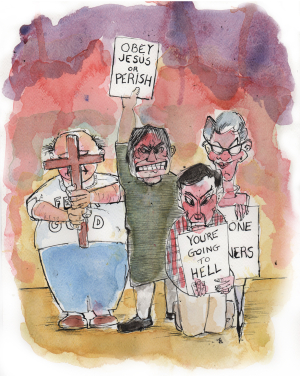
Whose Bad Books?
Whose Bad Books?
by Christopher Norris, with image by Martin Gollan
1
Our pastor, he said ‘Praise the Lord,
Give praise unto His name,
And spread the gospel news abroad:
To save your souls He came!’.
He said ‘The grapes of wrath are stored
For those who bear the blame
That drags us mortals Satan-ward
To feed the Devil’s flame’.
I harkened, took it all on board,
And told my kids ‘For shame,
Listen up else you’ll be zero-scored
When God decides the game’.
But then I thought: ‘There’s things ignored
In all that he’d proclaim,
Things apt to strike a jarring chord
With folk outside the frame.
2
That Jesus, he had stuff to say
That goes for black and white,
Good news our pastor could convey
And help set old wrongs right.
You know, the bits not only they
But us black folks can cite
Because there ain’t no earthly way
They’ll spread the racist blight.
Truth, justice, peace on earth - let’s pray
Those words shed kindly light
And quench the flame whose kindling may
Burn fierce in darkest night.
A good man, Jesus, when he’d play
It down, that touch of spite
That blasted the fig-tree to pay
Those chatterers back alright!
3
But Christ-as-God’s the one who’ll see
You burn in Hell should you
Risk any word or deed that He
Deems wicked or taboo.
Old monks devised the Trinity
In hopes that it might do
To silence such rank heresy
Amongst the errant crew.
Still look around and you’ll agree:
It’s God, not Christ, that slew
Those legions of the damned whose plea
The wrong God listened to.
The one to whom they bend the knee,
The God of Soldier Blue,
Is He whose old book’s held to be
The sole book good and true.
It holds the one and only key,
The single passe-partout
Vouchsafed by Him to guarantee
They pay the homage due.
And when the tribal lords decree
Some holy war or new
Crusade to wage they’ll soon make free
With Joshua’s hullabaloo.
I hear it in their hymnody,
With our old pastor, too,
When he takes such unChristian glee
In tales of butchery.
It’s in the blood-filled oratory,
The martial tropes on cue,
The monotheists’ battle-spree
To get a God’s-eye view.
4
But nearer home I saw it fill
The airwaves, tv screens,
And op eds: ‘they went out to kill,
Those two black female teens.
A woman elderly and ill
They killed by brutal means,
A Bible teacher who’d instil
God’s grace in wolverines.
Don’t blame their parents’ lack of skill,
Don’t blame it on their genes,
Don’t say it’s what their home-lives drill
Them into - death-machines!
No, we’ll not walk safe streets until
We’ve junked those childhood scenes
Of violence, want, and horrorsville
So justice intervenes.
5
For the Lord tells us: eye-for-eye
And tooth-for-tooth’s the law,
And those two girls have got to die
To quit the moral score’.
That’s what he said, the lawyer guy,
And the DA then swore
That it would anger God on high
If sins weren’t answered for.
It’s how they think, the folk who buy
That vengeful line - what more
Effective way to block the cry
Of conscience they ignore?
It’s him, the Moloch-god, who’ll pry
Into the hate-filled core
Of minds long driven far awry
By that god-awful lore.
Those old books have the sinners fry,
And their god wipe the floor
With infidels who dare to try
The penalties in store.
O there’s good bits, you can’t deny,
Like passages that soar
On prophet-wings to touch the sky
Or heaven’s gleaming shore.
Yet always there’s some sinner nigh,
Some tribe to shock and awe,
Or angel to touch Jacob’s thigh:
‘Not yours but God’s, this war!’.
Our pastor has his own supply
Of bible-quotes he’ll draw
So swiftly on you never spy
Some massacre in the raw.
But that’s the itch they satisfy,
The itch of tooth and claw
To hear him conjure deeds we’d shy
From once through the church-door.
6
And now each latest bulletin
From Gaza lets us know
Once more how massacres begin
When preachers run the show.
The same old talk - ‘wages of sin’,
‘God’s children’ or ‘God’s foe’,
‘We chosen ones’, ‘you devil’s kin’,
And suchlike to-and-fro.
It’s still the same old tales they spin,
The tales that strike a blow
For each hate-manual and its twin -
Two creeds, same war-tableaux.
Sometimes I think the guys who’d pin
The death-rap on those low-
Life scapegoat girls are mirrored in
The siege of Jericho,
Since that’s the mythic origin
Of what the victims owe
To bible-lore when victors win
On points scored long ago.
The truth ‘all one beneath the skin,
All kindred, bro and bro’,
Gets lost each time the trumpets’ din
Brings yet more grief and woe.
For it’s the vengeful god within
That answers when they blow
And spike some war-primed endorphin
With carnage to bestow.
7
I catch the bible-bashing tone
In that DA’s appeal
For the death-sentence to be thrown
At those too hurt to heal.
I catch it in the battle-zone
Reports of those whose zeal
For far-off kills by bomb or drone
They’re hard-put to conceal.
But you’ve a language all your own,
You holy men who deal
In sanctifying missions flown
Or fusillades of steel.
It’s your God churns the flesh and bone,
Whips up the hate they feel,
His chosen ones, or sees them blown
To bits unless they kneel.
He taunts the victims as they groan
On the inquisitor’s wheel,
And tells his flock ‘Let them atone
Beneath the Seventh Seal’.
For it’s a savage seed they’ve sown,
Those scriptures that reveal
Depths of malignity unknown
Till blind faith makes them real.

